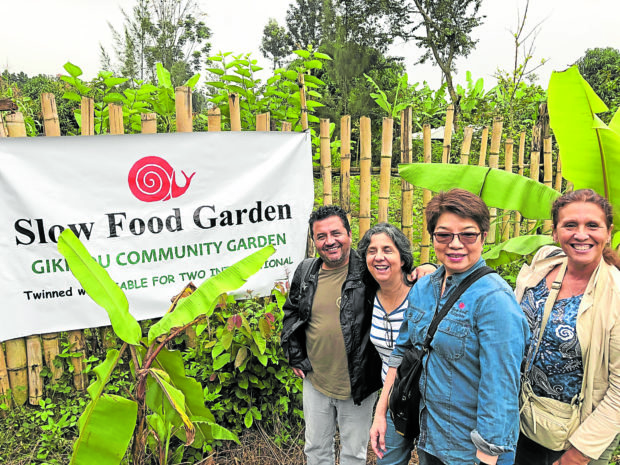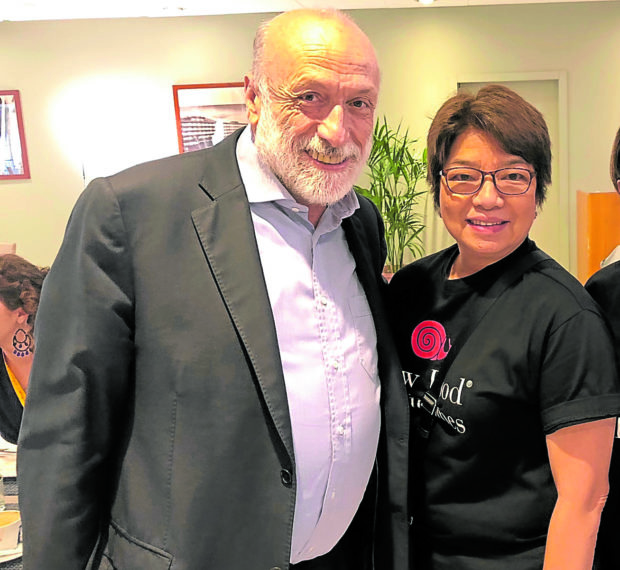Taking it slow in a fast-paced world
Yes we want to change things fast, but in a slow way. And what inspires us to do so is our being part of Slow Food (www.slowfood.com), a grassroots movement to eat good, clean and fair food.
How is going slow possible?
In Palawan, a friend started what is inspired by Israel’s kibbutz—a commune type of arrangement where five farmers work in the same area but doing complementary activities—one is making soil, one tends to animals like goats and chickens, one does vegetable plots and the two others may do aquaculture, rice or tend to fruit-bearing trees. Also in this model is a 100-square meter plot of lowland vegetables like pechay, talong and alugbati, or just pinakbet ingredients. In this kibbutz model, the farmers complement each other’s harvests and are able to eat a balanced meal, without having to go to market.
Another model is urban gardening where a limited space can have “towers” growing your favorite salad vegetables or herbs, but vertically. They occupy a small footprint of roughly 2 feet x 2 ft or give or take a square meter—like two filing cabinets.
Food secure
This pivot to a “food secure” model is way better than waiting for pork prices to fall, fish prices to stabilize or prices of canned goods to be controlled. Self-sufficient farms, even small ones, are the answer to food security. The Palawan model has worked through the pandemic and has convinced farmers to collaborate rather than compete with each other while growing the complementing kinds of vegetables—which then brings prices down.
Slow Food also believes in using all that is within reach—making your own soil and fertilizers from organic matter. “Locavorism” is being pushed as the only alternative to avoid logistical challenges of moving food through long distances. Locavorism also engages the community to work together bayanihan style.
Our interconnected principles of good, clean and fair food also consider the benefits to biodiversity, which is the slow but better solution to climate change. We also help solve the intense heat and extreme weather conditions, albeit slowly, through our practice of multicropping as opposed to monocropping. This also brings back the bees and other insects which are beneficial to farming.
The other factor is the kind of seeds being used. Rather than hybrid seeds which promise high yields, we rediscover heirloom varieties or Open Pollinated Varieties of vegetables which ensure that a farmer may need to buy seeds (if it is not given by like-minded farmers) only once, and then produce the succeeding seeds by himself. The preservation of heirloom varieties will bring back our world to the kind of planet we had before Big Agri, Big Pharma and Big tech stepped in.
Small is beautiful
Big Manufacturer may also find people wanting fresher food than canned or processed. So the Biggies are starting to also collaborate with smaller companies and almost breaking down their “BIG is best” mentality back to “Small is beautiful” (Read Schumacher’s book published in the 1970s).
The farmer is the winner in the Great Reset. When we work with our hands to produce what we eat, we also involve the younger set who will now get to know our local fruits like duhat, macopa and santol versus Fuji apple and kiatkiat oranges.
And that is where this pandemic is leading us—to look back at what we used to eat, what we used to produce—before world trade compromised the state of the farmer producer. When we thought World Trade Organization was the way to be global, it actually made our farmers poorer as they could not compete with the volumes, high yields of Indonesia and Vietnam, whose soil, by the way, are now sadly too acidic and are needing rehabilitation. We would not want that to happen to our almost still pristine farmlands.
So, we are correct in moving slowly, because we did not harm our soil as much as the others did. We are correct in getting our youth to study tech and everything digital. Because biotech like agritech will make farmers produce healthy food, but using smart agriculture—being able to project weather patterns, using renewables, wind power, solar power and everything Mother Nature has given us.
In a town called Feldheim in Germany, they produce their own energy using wind and solar power, making them not only self-sufficient but able to sell their excess energy to other towns. Is that Utopia? Having your own power, literally and figuratively? It is possible. We only need to replicate what has already been done and continues to be practiced.
Nature’s revelations
As an entrepreneur affected by the pandemic, one needs only to reflect on why things are resetting, recalibrating and even upending plans of big companies and not just those of the small ones. Small companies or SMEs actually can pivot or reset faster if the owners take a little time to reflect on why “the impossible” or what we thought was impossible is actually happening already. As they say in school—“time out!” and everyone rests and recalibrates the play. Today, companies large and small have the same problems or challenges, just different in magnitude, but with the same situation—there is a pandemic, there is a vaccine, there are elections coming. The merry mix of these three factors is one for the books. And there is no book, or playbook, in today’s speak.
Even hard-nosed executives ought to sit down and reflect and ask “why is this all happening?” and really look for answers in Nature’s revelations. Then we can slowly adjust our mindset to environmental and social profit and believe that the money will soon follow.
Whether it is our Palawan model or the faraway German model, self-sufficiency is not a pipe dream. It is actually right under our noses, if we choose to see it. Or smell it. INQ
The author is the Councilor for Southeast Asia of Slow Food International. She is also a coffee crusader and a sustainability advocate. Follow her on twitter @chitjuan.
Project Rebound is an advocacy campaign that seeks to help Filipinos overcome the crisis through relevant and timely information they can use to make informed decisions. It is supported by Aboitiz Group, Coca-Cola Beverages Philippines, Inc., Globe Telecom, Inc., McDonald’s Philippines, PERA Hub, PMFTC Inc., and Union Bank of the Philippines, Inc.


